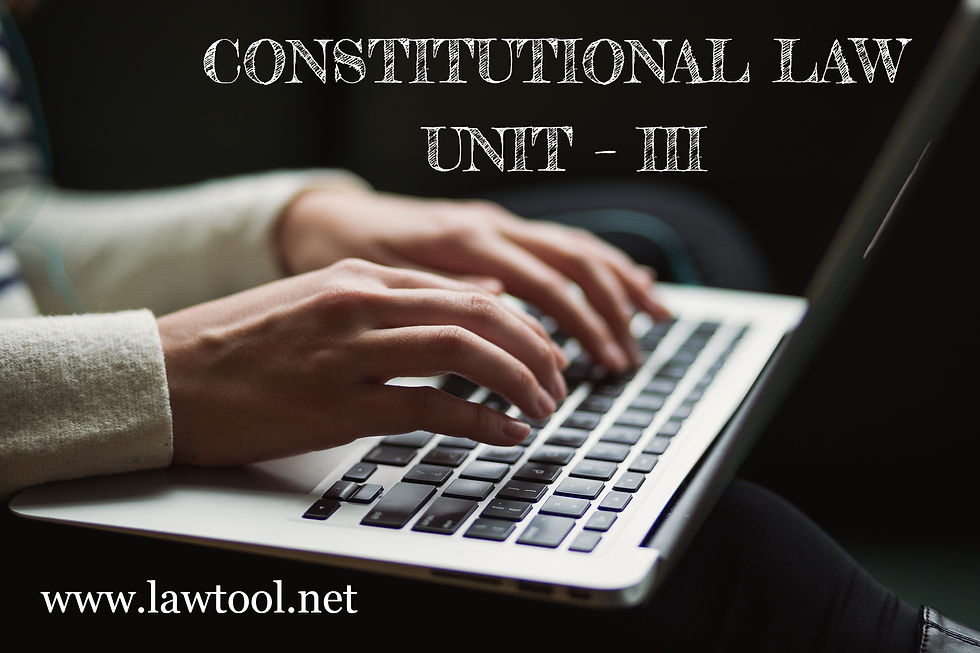CONSTITUTIONAL LAW – II UNIT – II
- www.lawtool.net

- 3 days ago
- 4 min read
Judiciary under the Constitution
The judiciary in India, as laid out in the Constitution, is a pillar of democracy. It plays a vital role in interpreting laws, safeguarding individual rights, and ensuring a balance of power among government entities. This post explores the intricacies of the Indian judiciary, focusing on the Supreme Court and High Courts. We will look closely at their appointment processes, powers, and the independence that is crucial for their effective functioning.
UNIT – II: Judiciary under the Constitution
Judiciary under the Constitution
Supreme Court of India
Appointment of Judges
Powers and Jurisdictions of the Supreme Court: Original, Appellate and Advisory Jurisdiction – Articles 131, 32, 136, 143
High Courts
• Appointment and Transfer of Judges
• Powers and Jurisdiction of the High Courts – Articles 226 & 227 Independence of Judiciary & Judicial Accountability
The Supreme Court of India
Appointment of Judges
The process of appointing judges to the Supreme Court is defined by constitutional provisions. According to Article 124 of the Constitution, the President of India, in consultation with the Chief Justice and other senior judges, appoints the Chief Justice and other judges.
Over the years, the appointment process has evolved significantly. Landmark judgments have established that it is not just a formality; it involves comprehensive discussions to ensure only qualified individuals take on these critical roles. For instance, in 2015, the Supreme Court ruled that the collegium system, where senior judges recommend appointments, should be transparent, highlighting the need for reform.
Critics have raised concerns regarding the collegium system's lack of transparency and accountability. Addressing these concerns is essential as studies suggest that judicial appointments influence the court's future decisions. In recent years, efforts to improve this system include calls for a Judicial Appointments Commission, aiming for greater transparency.
Powers and Jurisdictions of the Supreme Court: Original, Appellate, and Advisory Jurisdiction
The Supreme Court operates under distinct jurisdictions defined by various articles of the Constitution.
Original Jurisdiction
Under Article 131, the Supreme Court has original jurisdiction in disputes between the government of India and one or more states, or between multiple states. For example, in a 2020 case, the Supreme Court decided a significant dispute between the states of Maharashtra and Karnataka over water resources, which underscores the importance of such jurisdiction in national integrity.
Writ Jurisdiction
Article 32 empowers the Supreme Court to issue writs for enforcing fundamental rights. This provision is often called the "heart and soul" of the Constitution. A striking example is the landmark verdict in 2017, where the Supreme Court struck down the practice of instant triple talaq, emphasizing the protection of women's rights in a patriarchal society.
Appellate Jurisdiction
Article 136 allows the Supreme Court to hear appeals against judgments from lower courts. This role is crucial as it provides an essential mechanism for reviewing potential judicial errors. The data shows that between 2012 and 2019, the Supreme Court admitted nearly 36% of the appeals it received, reflecting its vital role in ensuring justice.
Advisory Jurisdiction
Under Article 143, the Supreme Court can advise the President of India on legal issues. This jurisdiction emphasizes the Court's role in providing thoughtful legal counsel to the executive branch, promoting well-informed governance, and supporting democracy.
High Courts
Appointment and Transfer of Judges
High Courts serve as the highest court at the state level in India, with judges appointed similarly to those in the Supreme Court. Article 217 states that the Governor appoints High Court judges after consulting with the Chief Justice of India and the Chief Justice of the respective High Court.
Additionally, judges can be transferred between High Courts, a practice intended to balance the judiciary across states. Statistics show that in 2018 alone, over 50 judges were transferred to ensure impartiality and reduce regional bias.
Powers and Jurisdiction of the High Courts
High Courts have significant powers that help facilitate justice at the state level.
Writ Jurisdiction
Article 226 permits High Courts to issue writs for the enforcement of fundamental rights and various legal purposes. This jurisdiction is essential because it allows citizens to seek justice close to home, making the legal system more accessible. For instance, in 2021, the Delhi High Court ruled in favor of migrant workers seeking fair wages, addressing immediate grievances effectively.
Supervisory Jurisdiction
Article 227 grants supervisory jurisdiction to High Courts over lower courts and tribunals within their territory. This authority ensures that judicial standards are upheld and prevents lower courts from exceeding their jurisdiction.
Independence of Judiciary & Judicial Accountability
Judicial independence is a fundamental principle in the Constitution, vital for protecting rights and enforcing laws free from undue political influence. The judiciary's independence is crucial for a functioning democracy.
Yet, the notion of judicial accountability is gaining prominence in ongoing discussions. While independence is necessary, judges also must be responsible for their actions. The challenge lies in ensuring accountability without compromising independence, a balance that authorities actively work to manage.
Challenges to Independence and Accountability
Despite strong constitutional safeguards, challenges to judicial independence persist. Political pressures, delays in judicial proceedings, and concerns regarding the appointment and transfer of judges can undermine the system's integrity.
In recent years, debates around increasing transparency in the appointment process have intensified. Advocates argue for a more balanced approach to preserve judicial integrity while making the selection process more accountable.
Final Thoughts
The Indian judiciary under the Constitution illustrates a complex mix of power, appointment, and independence. The Supreme Court and High Courts are fundamental in upholding justice, interpreting laws, and protecting citizens' fundamental rights.
As India evolves as a democratic nation, dialogues about balancing judicial independence and accountability remain crucial. This balance is essential for a fair and impartial judiciary, fostering a legal environment where justice can flourish.
By grasping the intricacies of the Indian judiciary, we can appreciate its role not just as a guardian of the Constitution but as a vital pillar of democracy that demands continual vigilance and reform to adapt to the demands of a changing society.










Comments